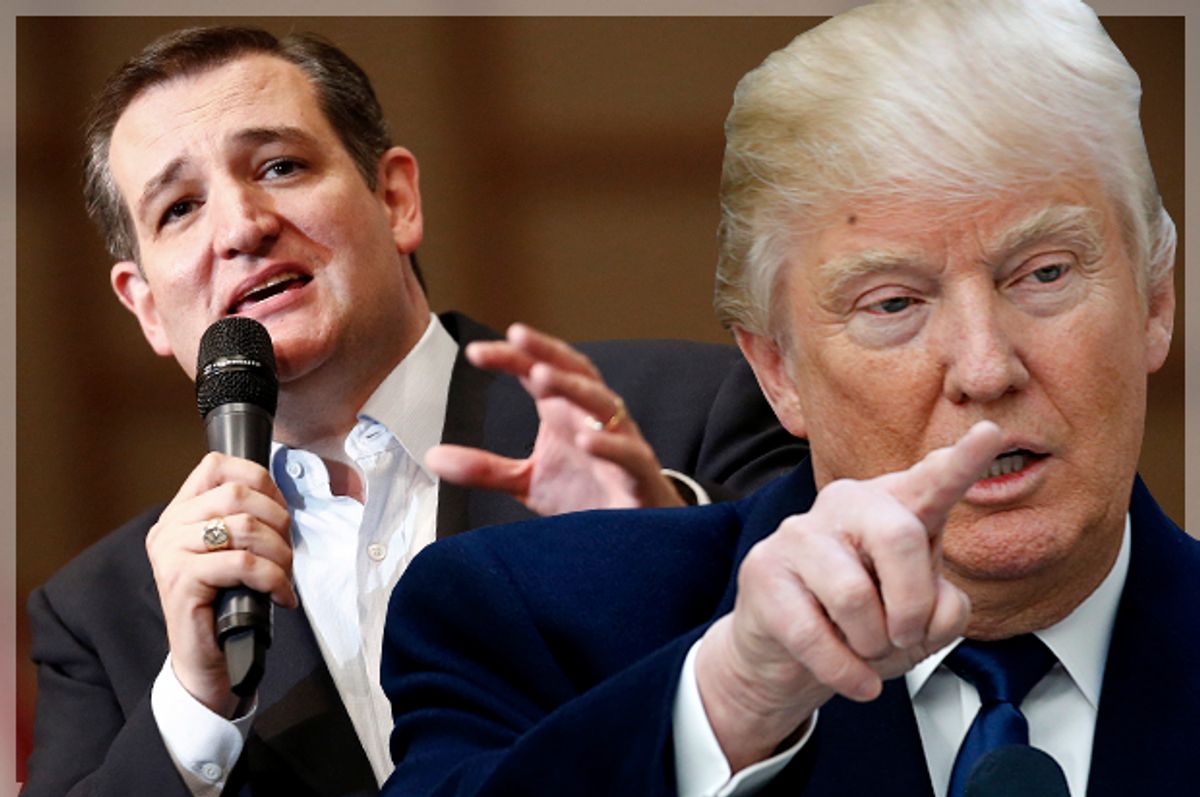Only hours after the Belgium attacks, Ted Cruz stated, “We need to empower law enforcement to patrol and secure Muslim neighborhoods before they become radicalized.”
The Republican presidential hopeful, trailing only Donald Trump, recommended specialized police forces be assigned to areas densely populated with Muslims. In essence, he suggested that the terror realized in Brussels -- which claimed the lives of 34 innocents and injured scores more -- mandates greater vigilance to prevent similar horror in the United States, in the form of special “Muslim Police” units.
Cruz’s “Muslim Police” proposal spurred immediate alarm within the media and criticism from law enforcement leaders. For many, the very notion that specialized law enforcement manpower and resources could be exclusively dedicated to patrolling Muslim neighborhoods seemed absurd in modern America, and more specifically, a patent infringement of core civil liberties protections.
Not far behind Trump in both delegates and rhetorical bluster, Cruz’s “Muslim Police” proposal was expectedly derided by elements on both sides of the political divide. However, closer inspection of prevailing national security strategy -- and specifically, the Department of Homeland Security’s expansion of counter-radicalization policing, also dubbed “countering violent extremism,” reveals that Cruz’s “Muslim Police” idea is hardly the brainchild of a polemicist on the far right, but a program already piloted by the Obama administration.
The “Muslim Police” are not only coming, but firmly patrolling and monitoring Muslim neighborhoods in several cities across America. Cruz’s post-Belgium attack idea is hardly unprecedented -- it is already installed policy.
In “Policing Radicalization,” a critical study outlining the structure and strategy of American counter-radicalization policing, Ohio State law professor Amna Akbar writes, “Radicalization and counter-radicalization are primarily if not almost exclusively concerned with Muslim communities.” Radicalization theory contends that the more steeped in religion a Muslim becomes, the more he or she is likely to adopt an extremist ideology.
Therefore, Islamic piety is the signal of radicalization. Nothing else, whether it be racist ideology or the militant nativism and xenophobia we see sweeping throughout the country, is linked to radicalization. Mirroring Cruz, DHS believes radicalization is a purely Muslim phenomenon, unfolding in Muslim neighborhoods.
Counter-radicalization policing, piloted in Boston, Los Angeles and Minneapolis in 2014, seeks to prevent this process, particularly in Muslim-concentrated neighborhoods, mosques, community centers and virtual spaces. In conjunction with DHS, which provides resources and direction to city police departments, counter-radicalization seeks to build relationships with informants within Muslim American communities. In turn, this has empowered interlocutors within Muslim neighborhoods to patrol and police members of their mosques, community organizations and city blocks. It has extended the role of Muslim Police beyond just official city policemen and -women, but also private citizens residing within Muslim neighborhoods.
But what specifically are “Muslim neighborhoods”? What what do they look like?
A 2011 study by the Pew Research Center, titled "Muslim Americans: No Signs of Growth in Alienation of Support for Extremism," found that 45 percent of the Muslim American population has a household income less than $30,000 per year. This figure was 9 percent higher than the figure for the general public, which stood at 36 percent, and counters the prevailing stereotype that Muslim Americans are a generally upwardly mobile, comfortably middle class community. While segments of the population fall within that status, roughly half are dangerously close to the poverty line or firmly working class.
The vast majority of “Muslim neighborhoods,” as posited by Cruz, are predominantly indigent and working class. This is true of East Dearborn and Hamtramck, two densely populated Muslim communities on on the outskirts of Detroit. Muslim enclaves in New York City, most notably Astoria and several neighborhoods in Brooklyn, are overwhelmingly indigent to working class, and since the early 2000s, subjected to NYPD surveillance before the formal piloting of counter-radicalization policing. NYPD surveillance also spilled over into nearby New Jersey.
Therefore, NYPD outrage over Cruz’s proposal was rather surprising, considering that the Department was not only a pioneer of counter-radicalization policing in the United States, but one of its principal architects.
Additional Muslim American enclaves in Chicago, Philadelphia, Minneapolis, and the West Coast, particularly Los Angeles – a counter-radicalization policing pilot city – are home to indigent and working class African American and immigrant Muslim communities, who are subject to disproportionate scrutiny and surveillance. Being Muslim, poor and a resident of a concentrated Muslim neighborhood markedly enhances the prospect of counter-radicalization policing, and the civil liberties perils associated with it.
In cities where counter-radicalization policing is currently being practiced by law enforcement, and in metropolitan areas where the the program is on the horizon, poor and working class Muslim neighborhoods are primary targets of surveillance. In the process, it has endangered the free exercise of religion and privacy rights of the most vulnerable segments of the Muslim American population.
While much of the country was alarmed by Cruz’s proposal, the reaction within Muslim American neighborhoods was radically different. “He’s not saying or proposing anything new,” observed Asha Mohamood Noor, 25, a Somali American racial justice advocate in Detroit. “Starting with U.S. Patriot Act after 9/11, and now with CVE policing, federal and now local police are prominent within many of our communities.”
Following in the campaign footsteps of Republican frontrunner Donald Trump, Cruz’s brazen rhetoric against Islam captures headlines and mobilizes voters. However, his latest bit of rhetoric is already reality, suggesting that concerned Americans should redirect their alarm to existing counter-radicalization policing programs, which have already deployed “Muslim police” units in a Muslim neighborhood near you.

Shares